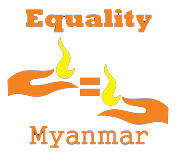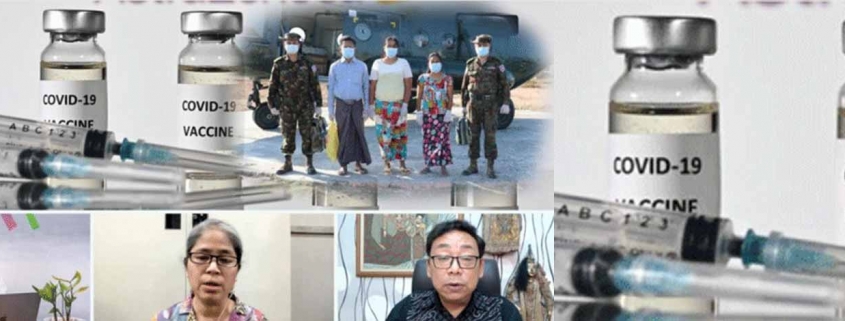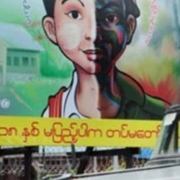By THE IRRAWADDY 9 January 2021
Ye Ni: Happy New Year! Welcome to Dateline Irrawaddy! This is the first dateline of 2021. The year 2020 was a hard year due to COVID-19, but since the Nov. 8 election and through New Year’s Day, we have heard good news. Executive director U Aung Myo Min of Equality Myanmar and writer Daw Mon Mon Myat join me this week. I’m The Irrawaddy Burmese editor Ye Ni.
The year 2020 was a hard year and we had to give up some of our individual freedom and rights willingly. We started to hear good news toward the end of 2020 as various vaccines emerged. So, there are hopes that there will be more good news in 2021. The fighting in Rakhine State ceased in November. It is good news that fighting ceased in a region which has continuously seen human rights violations. On International Human Rights Day, Dec. 10, President U Win Myint released a statement in which he pledged that the government would cooperate with civil society organizations [CSOs] to build a society that respects human rights. What is your assessment of the situation of human rights in Myanmar in 2020, and what are the prospects for 2021?
Aung Myo Min: It is welcome news. But taking a look at 2020 as a whole, it was a difficult year regarding human rights. It is fair to say that people suffered from the pandemic, human rights abuses and armed conflict. Human rights violations persist. There was religious persecution, and there were allegations in 2020 that there were more punitive actions against freedom of expression.
The number of people charged under the Telecommunications Law for sharing posts on social media was the highest to date in 2020. The number of cases filed against news media was the highest to date in 2020. What was worse were human rights violations in connection with the fighting in Rakhine State, which were quite serious. There were civilian deaths, injuries and grave violations of human rights in Rakhine with increased child deaths and sexual harassment of women.
But then, no effective actions were taken against those violations. There have been civilian deaths and detentions with no sides accepting responsibility. What’s worse, there is no proper legal system that can ensure perpetrators are held accountable. People suffered more serious human rights violations due to the fighting. The repatriation of Rohingya still can’t be carried out. Aside from the lawsuit filed against Myanmar by Gambia at the International Court of Justice [ICJ] over alleged Rohingya genocide, Myanmar is likely to face a lawsuit at the International Criminal Court. The formation of a commission on war crimes, crimes against humanity and genocide signals that Myanmar is facing greater pressure from international jurisdictions.
At first glance, COVID-19 is a health issue. But there were human rights violations during the pandemic using COVID-19 as an excuse. Restrictions on movement and gathering are fine. However, in some cases, there were unnecessarily tough restrictions [imposed]by abusing unclear laws and instructions. There was increased discrimination against some people using safety and health as an excuse, and there were increased attacks on the grounds of race.
And during the campaign period ahead of the Nov. 8 election, the laws were applied differently to different parties and in different places. So, there were criticisms as a result.
We have hopes for 2021. There will be a new government and a new Parliament. We have hopes for them. But we have to wait and see this year. We will have to see if they are as good as their campaign promises, and to what extent they can make progress in building peace, and to what extent they can fulfill the federal wishes of ethnicities and address their human rights violations. It is difficult to make a prediction now. But it is important that the government keeps its promises, keeps pursuing its stated objectives, listens to the voices of the people and collaborates with CSOs. And I’d like to urge the government to do so.
YN: Another big story besides COVID-19 in Myanmar was the Nov. 8 election. People overwhelmingly voted for the National League for Democracy [NLD]. The NLD government and NLD-dominated Parliament are taking office soon. Voters overwhelmingly supported the NLD with the expectations that the party would form a smarter government and continue to address tasks it could not accomplish over the past five years. Ma Mon Mon Myat, what are your expectations of the new government and the new Parliament?
Mon Mon Myat: We voted for the NLD in 2015, which was said to be the people’s government. It had to go through various difficulties including clashes and the unexpected pandemic. It is good for the country’s prospects that it can hold office for another five years after fighting tooth and nail for the past five years.
In fighting the pandemic, public participation was noticeable. The pandemic shows that public participation is necessary to overcome obstacles. There are notions that only the government and army are necessary when it comes to state building or state defense. The COVID-19 outbreak showed that it is impossible to overcome obstacles without public participation. State Counselor Daw Aung San Suu Kyi highlighted, in her speech about COVID-19, the people’s sense of responsibility. We can see that in difficult times the level of political maturity on the part of our people has increased. So our hopes have grown. I feel encouraged by the fact that we don’t need to rely only on the government, but we can pin high hopes on public cooperation.
Take a look at the speeches of three leaders. President U Win Myint highlighted that obstacles would be overcome through public strength. He focused on peace and stability, the two most important issues facing the country. Commander-in-Chief of Defense Services Senior General Min Aung Hlaing focused on peace. The Tatmadaw [Myanmar’s military] formed a peace negotiation committee after the November election and has been actively working for peace. The Arakan Army [AA] has released three [former]NLD candidates and three military personnel as a result of talks between the AA and the Tatmadaw. So we can be hopeful that there will be increased cooperation between the government, the Tatmadaw, and armed organizations toward more positive changes. The ruling party said even before the election that it would form a government of national reconciliation. After it won the election, it planned to hold talks with ethnic parties starting in Kachin State. This boosted our hopes that there will be more ethnic representatives in an NLD-led government. I hope the NLD will be able to form a better government and carry out more ambitious missions. We will wait and see.
YN: Implementation is important. While the NLD is confronted with numerous problems on the domestic front, it is under increased international pressure over the Rohingya issue, as Ko Aung Myo Min has pointed out. Whenever Western countries and America talk about human rights, the Rohigya issue is always a topic. And Myanmar has been prosecuted at the ICJ. And every year, Myanmar is condemned at the United Nations General Assembly over the Rohingya issue. This issue must be addressed. My view is that the government should cooperate with the international community rather than dismissing the allegations. Only then will we be able to save our reputation, I think. Ko Aung Myo Min, what are your suggestions to the government regarding the Rohingya issue?
AMM: We received increased international attention in 2020. The previous [military]government was always criticized on the international stage as an oppressive regime that imprisoned political dissidents. In 2020, Myanmar was increasingly known to the world in connection with alleged discrimination, human rights violations and genocide against Rohingya. Myanmar became almost synonymous with the Rohingya issue. The situation got worse in 2020. In the past it was just human rights violations, but in 2020 they were labeled crimes. So, international criminal procedures were applied to bring justice. This was unprecedented.
Daw Aung San Suu Kyi defended [Myanmar] against the lawsuit at the ICJ. She denied genocide, but there could have been war crimes, she said. Myanmar is still using the same approach the previous government used. Myanmar diplomats to the UN Security Council continue to say genocide allegations are just rumors and Myanmar would not cooperate if its national security and sovereignty can be harmed.
Only the government has changed, the attitude toward the international community has not changed. This is very dangerous. In the past, the quasi-civilian government came under international pressure when it denied human rights violations, and the image of the country was also tarnished. The incumbent government that calls itself the people’s government also speaks with the same voice and denies human rights violations. This can mar the image of the country and also undermine trust in the government.
Times have changed, and the government can no longer shut the door to the international community and deny allegations. Today, thanks to the internet, human rights abuses can be reported online in real time. There is undeniable evidence. The government should change its approach. It should confess to cases that did take place, and it should be willing to take responsibility and make the utmost effort to address the issue. The international community does not believe that there are no human rights violations in Myanmar. The government should therefore cooperate instead of denying the allegations.
Myanmar’s government denied Yanghee Lee, [then]UN Special Rapporteur on the situation of human rights in Myanmar, entry into the country. It has not granted access to new UN Special Rapporteur Thomas Andrew. The Myanmar government can show its willingness by allowing him to come to Myanmar and investigate freely to find out the truth.
UN member nations are set to meet on Jan. 25 to discuss nuclear ban programs. Myanmar’s government needs to clarify at that meeting what the real situation is and explain how it can cooperate. At the same time, it must hold the perpetrators accountable. But what the government is so far doing in response suggests there will be greater international pressures and greater calls for punitive actions.
YN: Daw Aung San Suu Kyi in her New Year’s speech highlighted the ethnic issue. She talked about a “New Peace Architecture” or an inclusive peace approach. An NLD delegation recently went to Kachin and Mon states to hold talks with local ethnic parties. And clashes have ceased in Rakhine State and former NLD candidates were released. All these indicate positive developments in ethnic issues. Ma Mon Mon Myat, do you think this is a good beginning that can lead to a good ending?
MMM: In her New Year’s speech on Jan. 1, she also talked about what the new government would do. She talked about the vision and mission of the incoming government. We should welcome it as she explained the initiatives.
She said the incoming government would implement the Union Accord Part III signed at the fourth session of the 21st Century Panglong Conference. She called the process “New Peace Architecture”. She said definitely that the new approach aims for distinct signs of progress toward the establishment of a federal union in 2022 when Myanmar marks the 75th anniversary of the Panglong Agreement. She said the new approach will enable participation of not only the key players like the government, Tatmadaw and ethnic armed organizations, but also civil society organizations. The government might have finally understood over the past five years that permanent peace and healthy development can be achieved only when all the stakeholders are involved.
That’s why she introduced the new approach. She also stressed the need to make an example in anti-corruption efforts and a departure from the old system. The main reason many of us felt frustrated with the NLD government is that it did not get rid of the old guard but kept them in its administration. Often the NLD government was criticized for that approach because people believe the old guard and their old habits hamper progress. She has kept them in consideration of national reconciliation.
From her speech, I infer that she has openly warned that she will no longer keep those who are corrupt and who haven’t changed their old habits and mindset. By saying that the old system must be left behind and general administrative reforms must be introduced, I think she is determined to introduce a new system. She focused on three sectors—health, education and economy—in her speeches. The performance of the Health Ministry improved during COVID-19 though we used to question its reliability. She said large investments will be made in the health sector in terms of health care infrastructure, universal health coverage and manufacturing of pharmaceuticals and medical devices in the country. This is welcome news. She also said that the incoming government will work on development of the private sector in education and economy. I view those as good commitments. If the NLD is as good as its word, we will be able to see a better future for our country in the next five years.
YN: Thank you for your contributions!




 Equality Myanmar (EQMM) is a leading nongovernmental organization that organises a wide range of human rights education and advocacy programs, the documentation human rights violations, and provides emergency support for activists, human rights defenders, and their families. We work with a range of local civil society organizations, educators, activists, various local actors, and our programs and activities reach all states and regions in Myanmar.
Equality Myanmar (EQMM) is a leading nongovernmental organization that organises a wide range of human rights education and advocacy programs, the documentation human rights violations, and provides emergency support for activists, human rights defenders, and their families. We work with a range of local civil society organizations, educators, activists, various local actors, and our programs and activities reach all states and regions in Myanmar.
